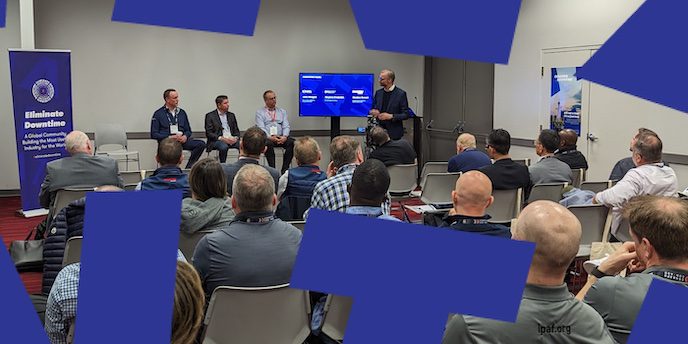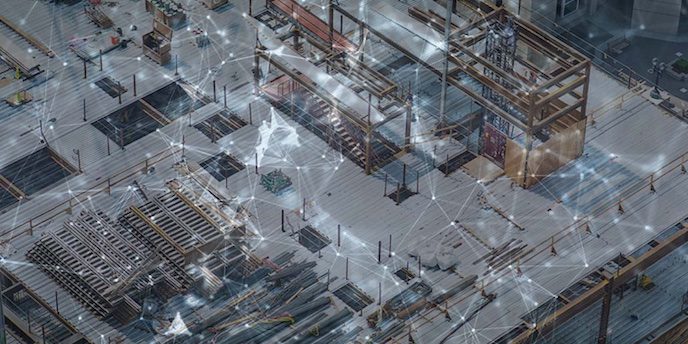

It’s not easy to eliminate downtime. If it was, it would have happened already. But, like turning a tanker, it takes time, effort and, above all, a commitment to the process. And that’s exactly what came through at a key Downtime event held at last month’s CONEXPO-CON/AGG event in Las Vegas.
At a panel discussion fronted by Trackunit Chief Executive Officer Soeren Brogaard, erudite inputs from United Rentals, Manitou, and H&E Equipment Services and backed up by from-the-floor contributions shone light on potential paths to eliminating downtime that could take hold over the next few years.
One such line of thought came from H&E Equipment Services Stephen Frederick who argued that the next big move in data could be the shift from “integration to interoperability.”
“Platform interoperability is somewhere we have to get to,” said Frederick, Chief Information Officer at Louisiana-based H&E. “It’s the difference between integration and interoperability where instead of systems translating data from one to another, we’re effectively speaking the same language.
“It’s effectively an evolution of the model towards complex automation and orchestration and, while we’re still early in that digital transformation journey, that is going to ultimately drive the industry towards safer, more sustainable solutions.”
Stephen Frederick
“It’s getting past structural standards and moving to semantics and it’s a progression we need to make,” he said. “It’s effectively an evolution of the model towards complex automation and orchestration and, while we’re still early in that digital transformation journey, that is going to ultimately drive the industry towards safer, more sustainable solutions.”
One of the undoubted benefits that would flow from that include filtering the data in such a way that makes it much easier for the customer to access and understand, a process United Rentals John Mongan was keen to stress.

“We’re moving into a more connected world and one of the things we need to do is make software that some people in the field who still tend to live in an analog world, will use,” said Mongan. “So how do we make the data most meaningful and separate the insights?”
Mongan highlighted the time pressures job site technicians and operators work under, but added that data that could help them manage costs, satisfy sustainability criteria on environmentally-friendly projects, and connect up in smarter, more effective ways delivering efficiencies over time that would bear on the battle to eliminate downtime.
“It’s how we can foster uptime,” said the United Rentals Director, Advanced Solutions Group. “And we can help that by being better at predicting when a customer’s machine needs maintenance.”
“If we can get uptime on equipment through diagnostics on equipment outage, we can be responding to issues before the customer does,” he added. “There’s an impact then on labor and project schedules and that is where our focus is as that’s where we can help customers.”
“If we can get uptime on equipment through diagnostics on equipment outage, we can be responding to issues before the customer does.”
John Mongan
That was a theme, Manitou’s Maxime Deroch warmed to. “As an OEM, we really want to give our customers the right information at the right time for the right machine. At Manitou, we are particularly focused now on predictive maintenance where we anticipate for our customers.”
Deroch added that more and more research is going into the machine age of any given machine, much as health industry specialists assess actual and ‘health’ body age of patients to discuss their wellbeing at any given stage of their life.
“We see this as a way to help eliminate downtime but ensuring users know how to use machines properly and enabling them to make the best decision when a machine goes down,” said Manitou’s President, Services & Solutions Division. “For this to work, we need credible data and to be able to trust data and that can also help us come up with a ‘virtual’ age for the machines.”
That would lead to significant safety gains, all three said, helping construction to gradually improve its record on the frequency of incidents in an often dangerous work environment. All three panelists also agreed that access control and access management systems would greatly benefit from better filtering of the data and would over time enable improvements to be made in the struggle to overcome downtime.
“Access control is really going to be one of those processes where we’re going to be leveraging technology to improve safety,” said Frederick. “Access management is a really hot topic now and it’s about delivering efficiencies from the right people being at the right machines.”

“Access management is one of those common elements that is going to be around for a long time,” said Mongan. “We need to think about how our customers are thinking about access management.”
Each stressed the vital importance of R&D investment in response to a question from Trackunit’s Brogaard, as key to unlocking the potential of data with Frederick citing an increase in IT spend of 15% for 2022 on top of a 10% rise in 2021 for H&E. France’s Manitou are also pouring resource into “getting the right data,” Deroch said in the quest for real, actionable numbers.
One outcome of better insight from the overwhelming glut of data could eventually be a move towards standardization, moving away from disparate benchmarks depending on different OEM models with different criteria.
“An ISO standard on data would give us something to anchor on,” said Mongan, while Frederick anticipated a move away from OEM devices as the industry becomes more mature, raising the prospect of either a single provider of data and insights or at least a more consolidated delivery of information to the end user.
Are you inspired by this story? To receive three insightful reads on data, strategy and tech from people across the construction industry in your inbox once a month, sign up to the Eliminate Downtime newsletter.
